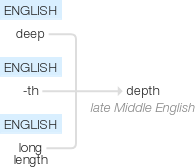Depth
late Middle English: from deep + -th2, on the pattern of pairs such as long, length .
wiktionary
From Middle English depthe, from Old English *dīepþ(“depth”), from Proto-Germanic *diupiþō(“depth”), equivalent to deep + -th. Cognate with Scots deepth(“depth”), Saterland Frisian Djüpte(“depth”), West Frisian djipte(“depth”), Dutch diepte(“depth”), Low German Deepde(“depth”), Danish dybde(“depth”), Icelandic dýpt(“depth”), Gothic 𐌳𐌹𐌿𐍀𐌹𐌸𐌰( diupiþa, “depth”).
etymonline
depth (n.)
late 14c., "a deep place, deep water, the sea," also "distance or extension from the top down (opposed to height) or from without inward," apparently formed in Middle English on model of long/length, broad/breadth; from dēp "deep" (see deep (adj.)) + -th (2). Replaced older deopnes "deepness." Though the word is not recorded in Old English, the formation was in Proto-Germanic, *deupitho-, and corresponds to Old Saxon diupitha, Dutch diepte, Old Norse dypð, Gothic diupiþa.
From c. 1400 as "the part of anything most remote from the boundary or outer limit." From 1520s as "quality of extending a considerable distance downward or inward." Figurative use in reference to thought, ideas, etc., "profoundness," from 1580s.
